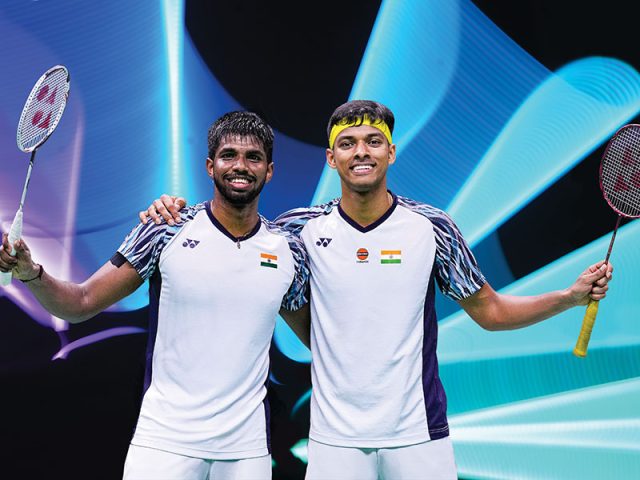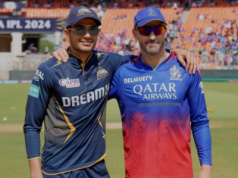
India’s rise to World No 1 in men’s doubles is phenomenal because the country never had a tradition or icons to look up to in this massively competitive discipline.
For Chandrashekhar Shetty, his son Chirag had made him absolutely proud, the day he won the Nationals. His friends in Mumbai often told him badminton was no sport to make a great career in, there was only cricket. But a young Chirag absolutely adored badminton, so the father decided he would support that hobby, without ever pressuring him on the ambition to be a world-beater. The National title brought contentment to the Shettys.
The World No 1 ascent on Tuesday – October 10 official rankings – will be a culmination of international title wins accumulated over the past year. Shetty Sr though elated with both the Asiad gold and the No 1 status, believes his greatest contribution to Chirag’s success was in stepping back at the right time, and allowing his son to take independent decisions while leaving it to the experts, the coaches. And never pressing him for dissections of defeats or pushing when he returned with a loss as a result.
“Everything above the National title is a bonus for me as a parent. He was good for me the day he won Nationals. Chirag and Satwik have been doing well for themselves for 3-4 years now. The Asian Games gold was for India. My son wanted to play doubles badminton so I backed his decision and supported him,” Chandrashekhar Shetty tells this newspaper.
For Satwiksairaj Rankireddy, the most challenging phases of his journey were when he was rehabbing his way out of injuries, missing the Asian Mixed Team event even. Biding his time as the bones and tendons healed, he would slip into darkness whenever he was away from the sport. A bout of covid during the pandemic had also dragged him down, as he slowly learnt to cope with resting, when away from the adrenaline of the sport.
It got tough when he was alone in the Hyderabad home, dealing with an injury at the start of the year. His parents Kasi Viswanath and Rangamani would travel from Amalapuram and keep him company to get through those phases. His brother Ramcharan is his bouncing board ahead of tournaments, and is known to cook his comfort food when he first lost and subsequently won the French Open in the course of this journey.
National coach and mentor Pullela Gopichand has often talked about how Kasi Viswanath, himself a state level player and international umpire, ceded the crucial decision-making to Satwik’s coaches, never interfering and trusting him when he told the father that his son ought to play doubles, not singles. India’s rise to World No 1 in men’s doubles is phenomenal because the country never had a tradition or icons to look up to in this massively competitive discipline. While Saina Nehwal and Kidambi Srikanth knew a pioneer in Prakash Padukone and were steered in their rise by Gopichand and later Vimal Kumar, Satwik and Chirag were on unscoped territory throughout, with little incentive to take up doubles or guarantees of success a decade ago. Gopichand had his hunch that Satwik had the game for the long haul in doubles, and the conviction to persuade Viswanath that it was the right decision – this at a time when Saina, Sindhu and Srikanth were at the top, and the visible posters.
Through personalised attention in their physical strengthening which is a bedrock of their game at the turn of their 20s, and by getting them the right technical expertise, the coach also knew when to step back, and let Mathias Boe, take over. Throughout the past few months when he’s resumed travelling, he keeps his counsel in the mid-set intervals, while Boe does the talking. It was most noticeable during the semis against Aaron-Soh at Asian Games, when two Malaysian coaches were telling the two players two varied things, while in contrast, Boe addressed Satwik and Chirag, avoiding confusion.
While Boe is the brains and backbone behind the duo and they acknowledge the sacrifices he makes by staying away from Denmark to accompany them, the Malaysian coach Tan Kim Her left a lasting piece of advice too besides bringing them together. Chandrashekhar Shetty recalls, “Coach Tan told them very early that they need to be friends off-court first before their on-court chemistry kicks in, and that has stayed with both,” he says. They worked on the bonding with meals together, and sharing rooms and trading music and food tastes, getting past the early language barriers.
Both have had to bide time while the other recovered from illnesses and injuries, as well as learn skills on court to cover for each other. They rarely mirror or parrot each other, and have retained their individual identities and personality traits, but there’s genuine respect and affection for the other. Success has been steady, with many painful losing streaks and first round exits that bring them social media hate, in between the headline wins. While the Indonesian Open, Asian Championships and Asiad gold have been the marquee wins, it’s in bouncing back from losses at Singapore, Copenhagen and China that they have stuck by each other.








